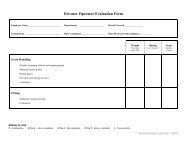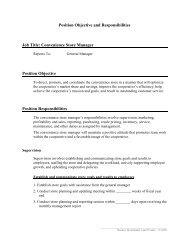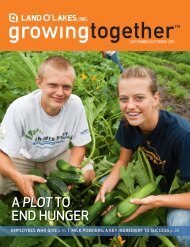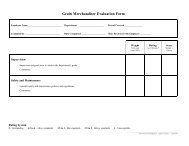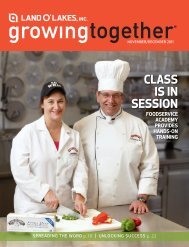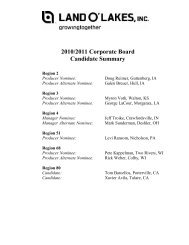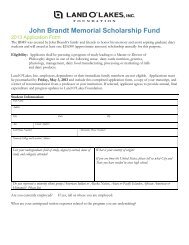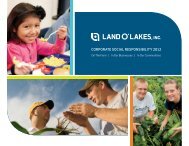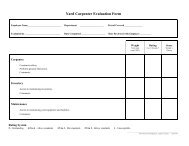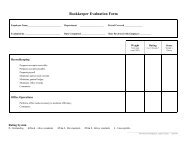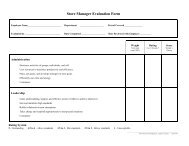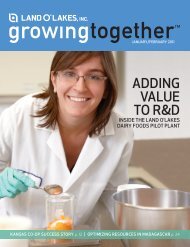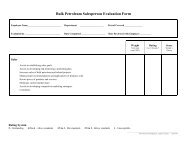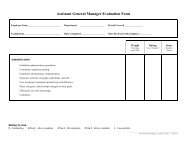2011 March/April Issue - Land O'Lakes Inc.
2011 March/April Issue - Land O'Lakes Inc.
2011 March/April Issue - Land O'Lakes Inc.
- No tags were found...
You also want an ePaper? Increase the reach of your titles
YUMPU automatically turns print PDFs into web optimized ePapers that Google loves.
organized through MBGs in early 2008.By going through MBGs, members cannow access livestock insurance under ablanket policy that reduces the premiumcost per cow, depending on the breed.Lucy Chimeta paid $31 for a one-yearinsurance policy to cover her cross-breedcow, which was producing an average ofSince January 2007,<strong>Land</strong> <strong>O'Lakes</strong> InternationalDevelopment has workedwith MDDA partners toimprove livelihoods,business developmentservices and householdnutrition for approximately2,600 smallholderfarmer-members…10 liters a day and providing the familywith $140 a month in earnings. Lucynoted, "The income from the cow allowedme to send my children to school and buyclothing and other food for them, likemeat and eggs that they wouldn’t otherwisehave."Stimulating financial vitalityThe death of Lucy’s cow due to calvingcomplications could have had a disastrousimpact on her family’s quality oflife. But since she had purchased an insurancepolicy, Lucy was able to replacethe cow and even purchase a second femalecalf that is providing the family withadditional milk income.As much as insurance has helped,MDDA beneficiary farmers face additionalchallenges in accessing secureand efficient banking systems to capturemilk proceeds from dairy processors. Tomanage this challenge, <strong>Land</strong> <strong>O'Lakes</strong>partnered with NBS Bank to bring a mobilebank to the MBGs, a service thatallowed them to access banking at theirfront door. MDDA is currently workingto integrate cell phone banking into theprogram so that farmers can move andaccess funds more efficiently from remotelocales.The program’s innovative financingmechanisms – such as banking, insuranceand one-time matching grants –stimulate investments in the value chainto boost milk production, and improveherds and animal health.One MDDA grant enabled the firmNdatani Investments to begin sellingthe urea mineral licking blocks anddairy mash feed smallholders desiredto improve their cows’ production. Asa result, Ndatani was able to roll out itsnew Premier Feeds brand of dairy mash,which it now sells to farmers by travelingto MBGs on a weekly basis.As integral as private sector approachesare to the alliance’s success, respondingto smallholders’ demand-driven needs isequally fundamental. For many, the mosturgent need is access to dairy cows. Tomeet this demand, MDDA developed asustainable heifer loan scheme, workedwith the government to formalize correspondingnational policy, expanded theavailability of heifers through breedingservices, and improved animal healthand breeding rates with veterinary care.On average, farmers receiving a singlecow through the MDDA program have increasedtheir incomes by at least $1,454 ayear in a country with an average annualincome of $250.Supporting community healthand prosperityAt the Chitsanzo Milk Bulking Group, 63kilometers south of Lilongwe, the MDDAmodel has been so successful in improvingincomes and food security that its membersare now donating 15 liters of milk each weekto a local childcare center. Their donatedmilk is used to create an enriched porridgefed to at-risk children, with the local communitydonating flour toward the meal.<strong>Land</strong> O’Lakes provides training on nutrition,milk handling and hygiene to staff andcaregivers at the childcare center.Many MBGs have capitalized on theirsuccess by using the model to diversify investmentstrategies and business lines. Inturn, this has helped insulate the groupsfrom “shock” in the dairy market. For example,Chitsanzo MBG raises funds byselling oil produced through a collectivelyowned oil press that they use to grindnuts and sunflower seeds.The MBG structure provides an excellentvenue for raising awareness ofhealth issues. With funding from the U.S.President's Emergency Plan for AIDSAt the Chitsanzo Milk BulkingGroup, 63 km south ofLilongwe, the MDDA model hasbeen so successful in improvingincomes and food security thatits members are now donating15 liters of milk each week to alocal childcare center.Relief (PEPFAR), MDDA and its partnershave already conducted HIV prevention andeducation efforts at all 23 MBGs. To date, atotal of 2,658 farmers have been reachedthrough behavior change communicationsefforts, of whom 44.6 percent have accessedHIV counseling and testing servicesthrough the program – an access point fornutrition and health awareness that wouldnot have been possible otherwise.This “Note From the Field” was preparedfor the USAID Microenterprise Developmentoffice under the Knowledge-DrivenInternational Development (KDMD) project.This Note is featured on the Microlinks website(link to: http://microlinks.kdid.org/),and in the December 2010 issue of MicrolinksConnections. ■www.landolakesinc.com MARCH/APRIL <strong>2011</strong> 23



